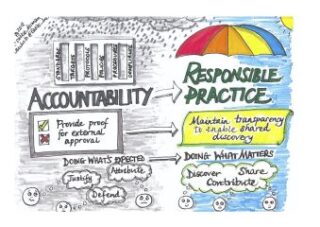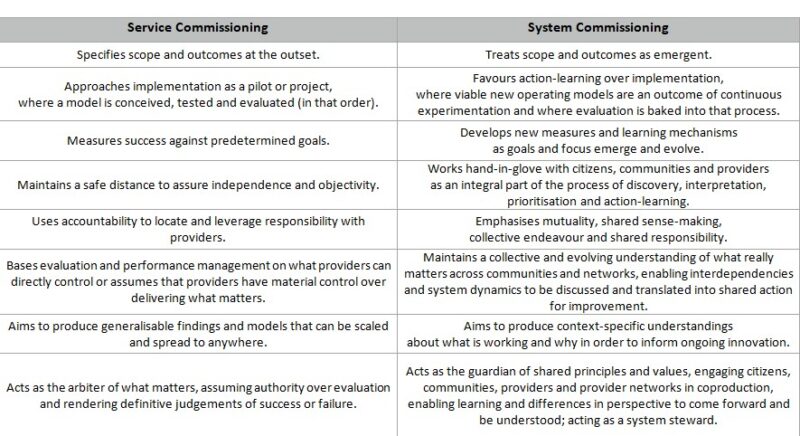Q Exchange
Improving together: ultra-local learning partnerships
- Proposal
- 2024

Meet the team
Also:
- Sophy Gretton, Consultant in Palliative Medicine, University Hospitals Bristol and Weston NHS Foundation Trust
What is the challenge your project is going to address and how does it connect to the theme of 'How can we improve across system boundaries?
Large-scale change is often attempted through ambitious programmes: solutions are designed, delivered, piloted and “rolled out”. But outcomes aren’t as intended; people and relationships can suffer – frustrated and fed up with implemented “change”.
In “Workforce and Models of Change” (2023), we learned that:
- Solutions are ‘Discovered and Grown’ not ‘Invented and Implemented’.
- Ultra-local relationships and locus of control really matter:
- complexity at ultra-local level drives outcomes and experiences
- absorbing this complexity requires rapid, continuous adaptation in local contexts – most effective when ultra-local partners have strong relationships (across system boundaries) and sufficient authority to act.
However – it’s easy for ultra-local capacity and focus to be drawn into reactive ‘fire-fighting’ or to get stuck in old patterns.
We propose an offer of support to local or ultra-local learning partnerships – to enable discovery of the patterns underlying current issues, clarity – “seeing through the fog of complexity” – and support rapid, small-scale iterative tests-of-change.
What does your project aim to achieve?
Through this project we seek to address these questions:
- What impact do ultra-local partnerships have and what does it take to support them?
- How does this inform how to effectively lead and commission health and care systems?
Offering support to ultra-local learning partnerships:
- Small scale iterative safe-to-fail tests of change – simple changes can have surprisingly powerful effects.
- Legitimise and embolden efforts, whilst further developing local relationships.
- Enable a cultural change towards a more generative approach to governance and system-commissioning for better outcomes and experience at lower cost.
Learning from situations which the current system struggles to support can deepen understanding of contributing factors, helping to ensure that tests-of-change reduce rather than exacerbate inequities.
Our experience so far suggests that learning-focused, action-oriented collaboration can enhance a sense of purpose and agency, helping people working in health and care – as well as the communities they work in – to thrive.
How will the project be delivered?
This is an offer of structured support to up to 3 ultra-local partnerships:
- To develop and learn from tests-of-change to address local issues in context.
- Development of key enabling resources, e.g. a playbook of methods for ultra-local collaboration and improvement.
- It could include work with commissioners to sustainably leverage the potential of ultra-local learning partnerships in their area.
The team includes people skilled in improvement support, bringing people together across system boundaries in generative, collaborative ways. They have a strong track record of collaborative improvement support across the south west.
Value for money is enabled by support tailored to local context in a combination of online and face-to-face formats. The small-scale, safe-to-fail tests of change enable rapid learning cycles, demonstrating impact with minimal waste. A focus on real-world scenarios ensures relevance to local context, building local capabilities. Regional scope enables teams to learn from and with each other.
How is your project going to share learning?
The project has potential to generate learning not only through the specific tests-of-change developed in participating sites, but also deeper learning about the conditions and methods which enable this on a sustainable basis.
Enabling resources will be developed, such as a playbook of methods:
- for ultra-local collaboration and improvement,
- to enable moving from service-commissioning towards system-commissioning, and
- moving towards generative approaches to governance.
We will use a range of media (e.g. audio-visual as well as written formats).
Online open learning sessions will be hosted through the course of the project to share what and how we are learning, and invite mutual learning with other sites. This has potential to further develop the sense of community, mutual support and collaborative learning both within the region and across the country.
A synthesis report will summarise what’s been learned, what hypotheses have been generated through this work and fruitful future actions.
How you can contribute
- Share your views on our proposal.
- Any and all suggestions, questions or challenge are welcomed.
- If you’re involved in supporting or participating in ultra-local learning partnerships (anywhere in the world) we’d be glad to connect.
- If you’re interested in taking part or exploring how this could develop in your local area we’d love to hear from you.
- Contact us either in the comments below or by email - saskie.dorman@nhs.net or kath.rooksby@nhs.net
Plan timeline
| 14 Mar 2024 | Making Change Together event. Engage with potential participating sites (March-June) |
|---|---|
| 8 Jul 2024 | Confirm with participating sites |
| 15 Jul 2024 | Co-design workshops with participating sites including practitioners and commissioners (July-Aug) |
| 2 Sep 2024 | Iterative tests-of-change; understanding impact embedded as part of process (Sept-Dec) |
| 4 Nov 2024 | Open online sessions - sharing what and how we’re learning (Nov/Feb/May) |
| 3 Feb 2025 | Co-design enabling resources - playbook of methods for ultra-local collaboration (Jan-Mar) |
| 1 May 2025 | Synthesis report (April - May) |

Comments
Siobhan Aris 19 Mar 2024
It is hard to articulate how invaluable this net work / community is. 18months ago + I joined the South West Regional meeting and as a result have had the opportunity to actively take part in Workforce Models of Care & Vital Signs work, Journal Club, Clean Language and was at the South West End of Live Network events Making Change Happen 14th March 2024. Never have I ever felt so part of a Network / community, the collaboration across the network has a genuine energy to it, a want to enable change that has an impact & to do this together, to see the solution not the problem. Saskie Dorman, Kath Rooksby, Andy Brogan and Sophie Gretton are a huge part of creating this energy and momentum. This work has not only already started new conversations that will / are changing pt and carer experience and service delivery. I doubt I am alone in wondering how we could capture the professional experience of the SW Network / Community - I’ve learnt so much, feel my access to support and expertise has grown immeasurably, have met many new & invaluable South West colleagues i wouldn’t want to be without,. Thank you
ANP, SPC. Cornwall
Saskie Dorman 20 Mar 2024
Hi Siobhan,
Your comment brings a huge smile - collaborative learning in community, what's not to love?! You are already creating those new conversations, different kinds of conversations, and it's wonderful to see - an inspiration. Thank you!
Saskie
Nikki Shephard 19 Mar 2024
Having attended the Making Change Together event (14/3) I am excited to hear of this proposal. Experiencing the energy, motivation and commitment from the people in room at the event demonstrates the need and desire for this project - to continue this change movement. What can be achieved when bringing like minded people together is nothing short of amazing, demonstrating that solutions are indeed developed and grown and without boundaries.
Saskie Dorman 20 Mar 2024
Thanks so much for your support and the energy you bring Nikki.
"What can be achieved when bringing like minded people together is nothing short of amazing, demonstrating that solutions are indeed developed and grown and without boundaries" - this has me thinking about improvement not just 'across boundaries' but also 'without boundaries'. What kind of boundaries? Are the boundaries we perceive mainly abstract, imaginary even?
keziah pietersen 19 Mar 2024
The south West network has been an invaluable resource to date. This proposal encompasses collaborative learning across multiple environments and offers the opportunity to incorporate communication and shared working between hospital, community, hospice, ambulance service and other resources. The shared learning that emphasises patient centred approaches should not be underestimated.
The ambulance service will particularly appreciate greater system sharing to enable the best and most appropriate patient care
Kath Rooksby 19 Mar 2024
Hi Keziah, it was great to meet you last week and I loved how a table talk created itself around your work and the value and connection to SWAST everyone has. Thank you for your insight here and support!
Sharon Drewett 18 Mar 2024
I really like this idea. Having taken part in several QI projects locally, it has become increasingly clear to me that lasting change requires local engagement from the start and measuring and demonstrating impact is key. Support to help chose tests of change, and meaningful evaluation measures to demonstrate impact will be so helpful, particularly for those with less experience in QI methodology.
Saskie Dorman 19 Mar 2024
Hi Sharon. Agreed - local engagement and ownership of any tests-of-change can make all the difference! Thanks very much for your message of support, much appreciated.
Linda Hughes MBE 17 Mar 2024
I am a volunteer patient and carer supporter and, representative. I have been very welcomed and involved in the early processes described. NHS commissioning is largely invisible to the public and certainly not understood. The way this process works has enabled me to share with patients, carers and, the wider public how the NHS can really listen to what most matters to them. And, together, find ways to improve existing situations and delivery. It becomes a genuine joint effort rather than a top-down instruction.
Saskie Dorman 19 Mar 2024
Many thanks Linda. Your support is much appreciated - including helping to make the invisible (or unseen) more visible. Yes - a genuine joint effort to enable improvements.
Rebecca Spicer-Thomas 15 Mar 2024
I attended the engagement event yesterday and am still on a high. A glimpse of how we can work together to improve the experience and outcomes for those we work with and support. A reminder why I came into the job I do; to widen access, to reduce silo working, to join together for greater impact. Unfortunately it is all to easy to slip back into firefighting mode even with the will not to. It is so important to have a steer and drive to help us all remember what we are striving to do, and without this alliance we would struggle.
Saskie Dorman 15 Mar 2024
Thanks so much Rebecca. Brilliant to have you with us at the event yesterday! Inspired by the collective energy - as you say, so much can be achieved through working together, reconnecting with the things that matter to each of us.
Guy Peryer 2 Mar 2024
Hi Saskie, this looks really great. I like the change in perspective to consider learning and collaborative culture. We're taking a similar approach in the East by looking at contributions and generative causation. This report reflecting the tensions around scale and spread may be of interest. I'd love to stay in touch about this. https://www.cambridge.org/core/elements/approaches-to-spread-scaleup-and-sustainability/B2A69BE3D579E3BDB5922340CE23D617
Saskie Dorman 10 Mar 2024
Thanks very much Guy - that's great to hear. Thanks for sharing the reference too. Would be delighted to stay in touch about this, share and compare notes!
Saskie
Comments are now closed for this post.